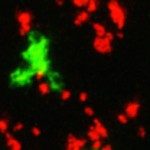Link to Pubmed [PMID] – 23417297
Proc. Natl. Acad. Sci. U.S.A. 2013 Mar;110(12):4458-63
The Gram-negative enteroinvasive bacterium Shigella flexneri is responsible for the endemic form of bacillary dysentery, an acute rectocolitis in humans. S. flexneri uses a type III secretion system to inject effector proteins into host cells, thus diverting cellular functions to its own benefit. Protective immunity to reinfection requires several rounds of infection to be elicited and is short-lasting, suggesting that S. flexneri interferes with the priming of specific immunity. Considering the key role played by T-lymphocyte trafficking in priming of adaptive immunity, we investigated the impact of S. flexneri on T-cell dynamics in vivo. By using two-photon microscopy to visualize bacterium-T-cell cross-talks in the lymph nodes, where the adaptive immunity is initiated, we provide evidence that S. flexneri, via its type III secretion system, impairs the migration pattern of CD4(+) T cells independently of cognate recognition of bacterial antigens. We show that bacterial invasion of CD4(+) T lymphocytes occurs in vivo, and results in cell migration arrest. In the absence of invasion, CD4(+) T-cell migration parameters are also dramatically altered. Signals resulting from S. flexneri interactions with subcapsular sinus macrophages and dendritic cells, and recruitment of polymorphonuclear cells are likely to contribute to this phenomenon. These findings indicate that S. flexneri targets T lymphocytes in vivo and highlight the role of type III effector secretion in modulating host adaptive immune responses.


